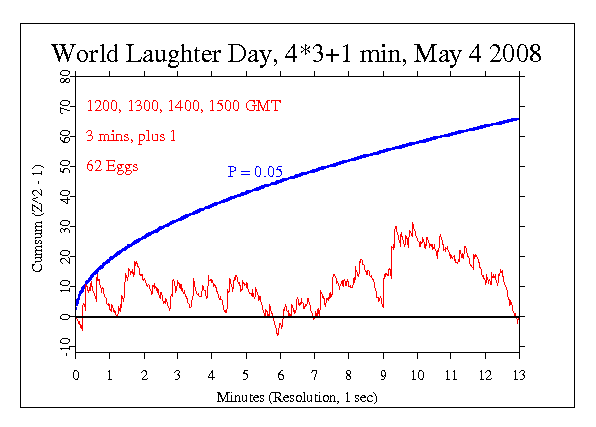|
I received a note from Michaela Schaeffner asking whether we
might monitor the celebration of laughter. She described it
nicely:
"This year celebration of the 10th World-laughter-day
will be at 2008 May the 4th.
About 6000 Laughterclubs (each with about 10 to 50
members) at 60
countries all over the world will have events with
laughter-yoga where we
are laughing at public parks or places with interested
people. And some of
the laughter-yoga-teachers will bring laughter at social
institutions,
like hospitals, homes for seniors and so on. Beyond this
we have an
international appointment for two actions:
1. at 12:00 GMT world wide laughter - we all laugh
together for 3 minutes
from 12:00 - 12:03 GMT. The following hours we repeat this
every full hour.
2. at 13:05 we try to send one minute laughter in the air
with help of local radio senders
Reading about the Global Consciousness Project, I`m
very curious to
know if there is any effect measurable caused by world wide
laughter.
Laughter will be more present at the mind of people this
day, forced by
the actions, radio and press-reports. Will it be possible
to see a positive effect? Is it possible to get the results from
the 4th May from your measurement?"
I responded that I thought it a good idea to take a look,
and since she had provided such complete and precise
information, it was straightforward to make a formal
hypothesis to test. It would be a composite (literally a
concatenation) of the 3-minute periods plus the 1-minute
radio broadcast. Of course we know that single events can't
reliably be interpreted, and we have good evidence that
most of the effects are driven by events of longer duration,
an hour or two at least. Nevertheless, I specified the
formal hypothesis for 4*3 minutes, plus 1 minute, as
specified by Michaela.
The result is a fairly flat trend for most of the time, which
culminates in a
Chisquare of 780.687 on 780 df, for a p-value of 0.486 and
Z-score of 0.035. This is, as noted, not to be interpreted
too strongly, but it suggests that the
laughter around the world, though delightful, wasn't
noted by our operationally defined global consciousness.
(It should be further noted that this small amount of data
was collected during the aftermath of the major disaster in
Myanmar, and its trend is counter to that seen in the long
term development following the cyclone.)

|